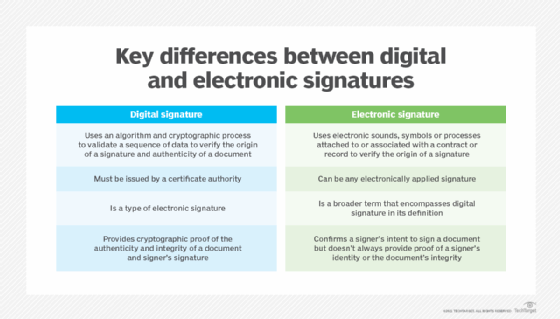E-Sign Act (Electronic Signatures in Global and National Commerce Act)
What is the E-Sign Act (Electronic Signatures in Global and National Commerce Act)?
The E-Sign Act (Electronic Signatures in Global and National Commerce Act) is a U.S. federal law that specifies that, in the United States, the use of an electronic signature (e-signature) is as legally valid as a traditional signature written in ink on paper. This Congress-passed act is also often referred to as the e-signature bill.
Passed on Oct. 1, 2000, the law saves companies that use e-signatures a significant amount of money by reducing mailing and handling costs for hard-copy contracts and similar documents. Specifically, the act validates electronic records and signatures for interstate and foreign commerce transactions. With the E-Sign Act, electronic signatures can be held to the same standard and legal scrutiny of authenticity as their paper signature counterparts.
One of the benefits of an e-signature is that it stores executed documents in a secure online archive, easily accessible to all parties for a specific length of time. The retention period is determined by the agency or governing body that has jurisdiction over the specific document.
Electronic signature software, such as DocuSign and SignNow, enables anyone to electronically sign legal documents. Other platforms, like Box, have also acquired digital signature software.
It's important to note that digital signatures and electronic signatures aren't the same thing. A digital signature is a type of electronic signature that uses encryption to associate a signer with a document.

History of the E-Sign Act
The Uniform Electronic Transactions Act (UETA) was introduced in 1999 and is a precursor to the E-Sign Act. UETA, which has been adopted by 47 U.S. states, as well as the District of Columbia, Puerto Rico and the U.S. Virgin Islands, validates electronic signatures when both parties agree to proceed with a document electronically. The remaining three states -- Washington, Illinois and New York -- have enacted similar legislation governing electronic transactions. UETA laid out circumstances and context to define the legal validity of electronic signatures.
The E-Sign Act had significant support in Congress. Some believed the bill would aid electronic commerce (e-commerce) by getting rid of legal fears over the validity of electronic contracts.
The E-Sign Act was signed into law on June 30, 2000, and went into effect on Oct. 1, 2000. A number of states already had electronic signature laws in effect, but the E-Sign Act ensured electronic contracts are legal for interstate and global commerce.
E-Sign compliance
The E-Sign Act grandfathered in existing agreements that existed digitally prior to Oct. 1, 2000. All agreements after this date, however, must comply with the following set of guidelines in the E-Sign Act to be considered legally binding:
- Intent to sign. Electronic signatures are only valid if the involved parties have the intention to sign. Signature requests can be declined.
- Consent to do business electronically. Involved parties must agree to conduct transactions electronically.
- Attribution. The signature must uniquely attribute to the individual signing the document.
- Association of signature with the record. E-signatures must have a mark on the document from the signer that can then be associated with the record.
- Record retention. Electronic documents must be savable, viewable and printable by either party.
Federal and state regulations might also have additional requirements for e-signatures. For example, additional requirements can surround security measures, such as limiting access to documents for authorized parties.
Exceptions to the E-Sign Act
Commonly listed exceptions to the E-Sign Act include the following specific types of documents and records that are governed by the courts:
- adoption paperwork;
- court orders;
- divorce decrees;
- hazardous material transport documentation;
- insurance benefits cancellations;
- notices of default, foreclosure, repossession and eviction;
- official court documentation;
- product recalls;
- some Uniform Commercial Code documentation;
- utility service cancellation notifications; and
- wills, codicils and trust documents.
What's the difference between E-Sign and UETA?
The E-Sign Act and UETA are the two primary electric signature acts in the U.S., and both were created to legally validate electronic signatures.
Both acts outline the same basic requirements for an electronic signature to be considered valid. These include the intent to sign, consumer consent to do business electronically, association of signature with the record and record retention.
The main difference between the two is that the E-Sign Act is a federal act, meaning that it affects those who do business in all U.S. states and territories. UETA is accepted on a state-by-state basis. Individual states and territories have the option to accept or reject UETA.
While UETA outlines the circumstances and context that define the legal validity of an electronic signature, states can still choose how much of it to follow. Because of this, not every state abides by the same outlines regarding electronic signatures. The E-Sign Act ensures each state has laws to validate electronic signatures. In most situations where there's a conflict between state and federal laws, the state law governs. The E-Sign Act also specifies that, while state laws don't have to conform exactly to this federal law, an equivalent protection for electronic contracts and signatures must be in place.
What is the E-Sign Modernization Act of 2020?
The bill, which was initially introduced during the COVID-19 pandemic in 2020, was designed to amend the E-Sign Act by streamlining how consumers consent to receiving electronic documents, such as bank statements, contracts and other account information. It specifically would repeal the requirement in the E-Sign Act that consumers be able to prove they can access documents electronically before they can agree to receive digital versions.
The bill passed in the Senate but went no further. The legislation was originally sought by the National Association of Federally Insured Credit Unions to help reduce the burden on financial institutions and increase consumer financial flexibility.
Learn more about six e-signature software providers, including DocuSign, SignNow and HelloSign.







